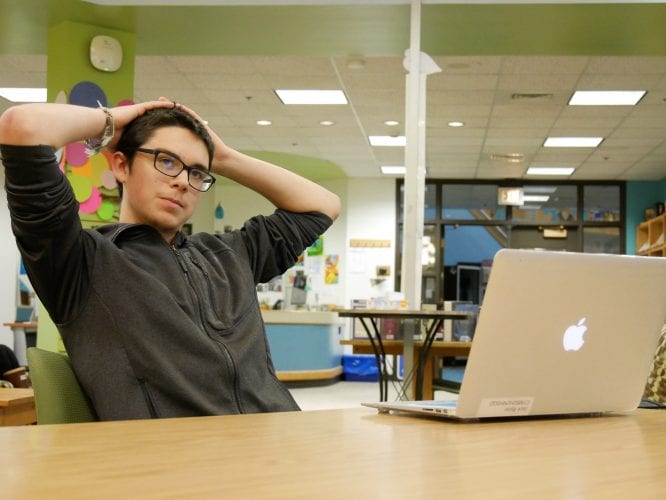
Petersburg High School junior, Jack Byrer, takes questions from the school board about ESports at a meeting, Oct. 9, 2018. (Photo by Angela Denning/KFSK)
Over 40 million people watched this video game playing out on their screens last year. It was the World Championships of League of Legends.
Jack Byrer is a Junior at Petersburg High School. He gave a presentation to the school board on what ESports is and why his club wants to start a team by next spring. He says they’ll eventually be able to compete against other schools.
“It’s just a sport, it’s a team based competition,” Byrer said, “much like basketball or football but it just includes video games instead.”
Byrer acts as the club’s coach right now. He says in competition teams use the skill sets of individual players to overcome the opposing team.
“It’s kind of like a game of chess,” Byrer said. “You outsmart your opponent so you can take all of their pieces until they fall. Except with ESports the decisions that can win games are not made in minutes but in seconds and milliseconds.”
Over 30 schools in the state have ESports teams starting up this fall. Alaska has followed Connecticut as the second state to join a national gaming program, Electronic Gaming Federation. The program supports three video games in a controlled setting: League of Legends, which is a battle arena video game, Rocket League, a soccer video game that also involves racing vehicles, and Overwatch, a shooter game.
There is shooting, fighting, and destroying other characters in the games but they are rated age appropriate by the Entertainment Software Rating Board.
The high school competitions would be online so little travel is needed but Petersburg Principal, Rick Dormer, says the players will still be held to the same academic requirements and drug policies as other sports.
“They’re a team and they really will be Petersburg Vikings competing, which means something here. You’re part of the community you are representing,” Dormer said. “And just because you’re not jumping and slamming a basketball, you are competing against other schools and that’s self-pride and a lot of scientific studies show that that is a higher connectedness in school and kids always do better in school when they’re more connected.”
Most of the games require at least five players. In Petersburg, the students meet every weekday from 3 to 5 p.m. in the school’s technology room.
“They thought first I lost my mind because we’ve been saying no gaming on the school issued lap tops,” said the district’s Technology Director, Jon Kludt-Painter.
He supports ESports even though he also encourages limiting screen time. Last year he helped bring the film, Screenagers, to town, which highlights the negative impacts of too much screen time on youth. Kludt-Painter says he understands the mixed message but ESports gives gamers who otherwise might be playing alone, an opportunity to come together.
“These kids are gaming already. They’re doing this at home and in their free time,” Kludt-Painter said. “And giving them an environment to do it that’s organized and safe I think is really one of the strong points to this.”
Petersburg’s Activities Director, Jaime Cabral, says although it hasn’t happened yet, the Alaska School Activities Association or ASAA will be accepting ESports as a sanctioned sport soon.











